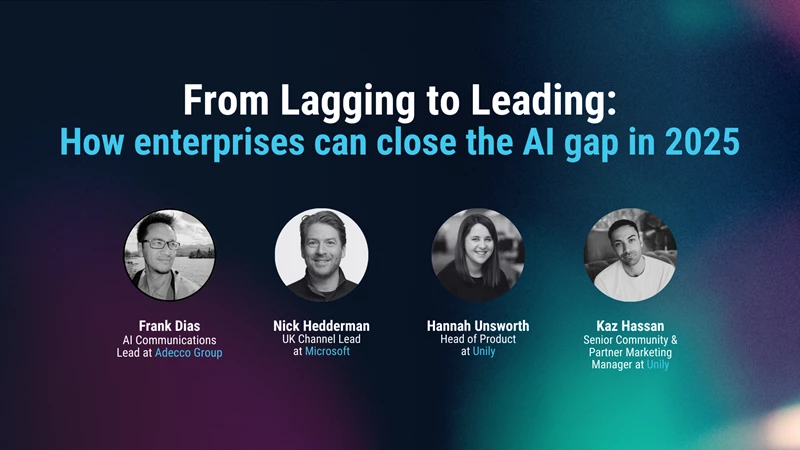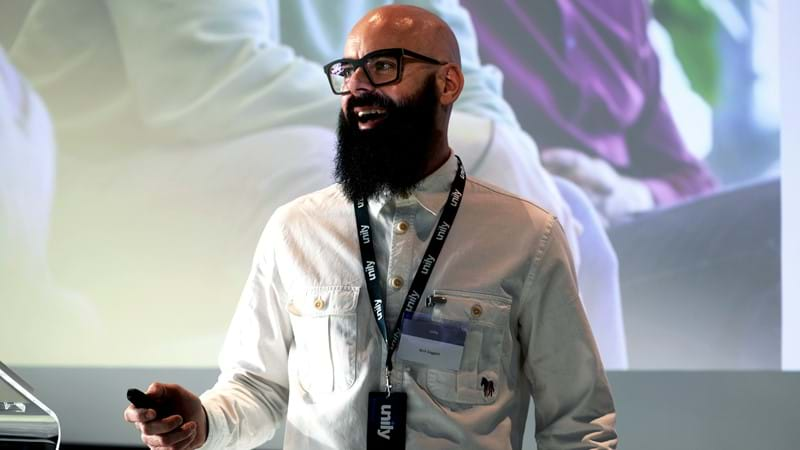Engaging employees through change
In the fourth installment of the Unily podcast, Paul Seda welcomes regulars Kaitlin Auriemma, Kaz Hassan, and Matthew Boyd, along with ‘the hardest working man in intranets’, Glen Chambers, to discuss engaging employees through periods of change. Keep your eyes peeled for an unexpected guest appearance by Michael Pike as well, who proves that the work from anywhere model really is alive and kicking at Unily!
Keep your employees in the loop during times of change
With so much change happening globally off the back of the pandemic, it’s easy for employees to feel disillusioned. From mergers and acquisitions, to team restructures, the past year has felt, for many, like the only constant is change.
But the key to maintaining employee engagement throughout ultimately comes down to communication and how you implement that.
How to engage employees through periods of change
It’s easy to assume that change = bad, but it doesn’t have to be. Change can be, and frequently is, positive, leading to enhanced engagement as opposed to something that you need to be concerned about.
The reality is that change is happening everywhere you look, whether you want to face it or not. So how can you engage your employees during these periods and turn it into a positive experience?
#1 Communication, communication, communication
It goes without saying that communicating the changes to your organization is one of the most effective ways to keep your employees engaged with what’s to come. The cornerstone of change programs is communications and messaging that explains what’s ahead in an honest way.
Matthew Boyd points to the source of employees’ reluctance to engage with change, highlighting that a lot of the fear around change is predicated on the unknown; you don’t know what the full impact of the change will be on you personally, and that automatically makes you resistant to it.
"A massive part of dealing with change within the organization is about being transparent and communicating effectively about the change that’s happening."
The Unily team agree that giving your people the information they need to make an informed decision will help to keep them engaged and less fearful of the future because they know what to expect. Whether you use your employee experience platform or email, pick the methods you need to reach your workforce effectively. The essential element is that you deliver the message clearly.
#2 Prepare for the change
Before the change itself has even happened, huge amounts of preparation will have been done behind the scenes to ready your organization for it. Bring your employees into this preparation by running employee engagement surveys and make sure everyone is fully briefed ahead of making any external announcements.
Your internal stakeholders, and anyone that is going to be impacted by the change, need to know the details in advance. Kaitlin Auriemma recalls a previous experience where two global brands merged and they discovered the need for preparing the workforce for a new future.
You can embargo information where necessary, but it’s important to have resource centers for employees to access any information they might need, on-demand. Give them answers to questions about how the change will impact their roles or line management, and provide guidance on what to say to any external parties.
"When employees experience changes that directly impact them, but the direct impact hasn’t been considered by leadership, that’s when people start to become disengaged or upset by the change."
#3 Be open and transparent
The Unily team talks in detail about the need to be open and transparent with the communication. Having a democratized system where employees can ask their leadership questions is something that is commonplace at Unily, and other organizations are utilizing this way of working. Glen Chambers talks about the concept of ‘ask me anything’ (AMA) and how leaderships can be open to questions from people across their entire enterprise.
Kaz Hassan speaks of a client that went through a merger, and how they introduced a ‘Straight Talk’ option within their internal communications. Employees could submit questions to leadership that could be written up into Straight Talk articles where they get clear, honest information about a particular topic.
There’s also discussion around the opinions of people across the workforce, and what the value of these opinions are. Glen Chambers mentions how it’s easy to submit ideas or opinions, but it’s not always guaranteed that these ideas will go anywhere. This provokes Paul Seda to highlight the importance of giving feedback on why certain decisions were made.
"Constantly feedback why you made that decision. Not everyone will agree but if you set the tables, you’re doing the responsible thing in terms of comms and keeping people in the loop."
#4 Lean on your technology
With a healthy dose of product marketing expertise on this episode, the conversation inevitably turns to the role of technology. Having it at our fingertips enables us to be able to take control of any type of change.
During the world of remote work, the adoption of new technology has accelerated exponentially, and this creates a great opportunity to use it to bridge those gaps and help organizations who are on those change journeys.
EXP technology is huge right now, but there’s a broad range of tech available that not only makes change more manageable, but helps us to put a positive spin on it. It enables leaders to be able to communicate with their enterprises more effectively and makes the information more easily consumable by their workforces. Ultimately, as Matthew Boyd puts it, technology can do a lot of the heavy lifting for these changes.
Interested in learning more about engaging employees through change?
If you’re keen to join the conversation or find out more about the insights of our team on employee engagement around change, check out the full podcast episode. It’s also now available to download through Spotify. For information on how we can support your organization through change, get in touch with our digital workplace experts.
Get started. Get your personalized demo.
Harness the power of your EXP to manage change in your enterprise













